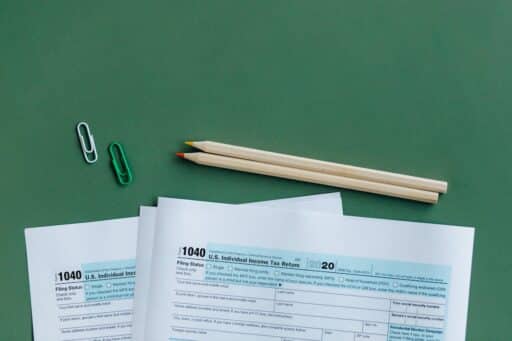Have you ever experienced living in different states, or are you considering moving from one state to another? Whatever your reason may be, whether to further your profession, be closer to family, or retire in a tax-friendly state, we know that it’s not an easy undertaking.
Seeking a place that will give you the comfort of home entails greater preparation and settlement. Being aware of state residency laws and their tax implications may help you avoid unexpected and expensive living arrangements.
This article covers everything about residency and how to deal with its impact on your taxes.
If you want to invest as an expat or high-net-worth individual, which is what i specialize in, you can email me (advice@adamfayed.com) or use WhatsApp (+44-7393-450-837).
This article is not formal tax advice and the facts might have changed.
What is more, every country has its own rules. Some, like the US, has citizenship-based taxation, whereas most don’t.
Does your residency status impact your taxes in the US?

It’s a given that in the US, one of the first questions considered important that you will be asked is to confirm if you’re a resident or not. That’s why understanding your tax residence status is important since it affects your US tax bill.
The biggest mistake non-residents make is filing taxes as residents. If they file as residents, nonresidents may collect benefits they are not qualified for. Incorrect filing violates a nonresident visa’s terms and restrictions. This then poses a threat to their future visa or green card applications and potential fines.
What is tax residency?
One thing you should know is that your US tax status depends on your residency.
Resident aliens pay worldwide income taxes like US citizens. On the other hand, US-resident aliens must report all income, domestic and foreign. Nonresident aliens must pay federal tax on US-sourced and US-related business income. Moreover, nonresident aliens must file a tax return, and it should be done for each year of US income.
Significantly, if you were a nonresident and did not earn any money in the US, you must complete Form 8843. Hence, it should be accomplished before the tax deadline.
What are the types of tax purposes in the US?
- Resident for Tax Purposes. To be acknowledged as a resident for tax purposes, your tax residency must require passing the significant presence test or green card exam within the calendar year.
- Nonresident for tax purposes. For tax purposes, you are recognized as a nonresident if you are not a US citizen or national and have not passed the green card or significant test criteria.
- Dual Residency. Dual-status aliens are residents for part of the year and nonresidents for the rest. This takes effect in the early or latter years of residency.
How is residency determined?

You must pass the substantial presence test or green card test. This should be accomplished in the calendar year to be a tax-resident immigrant.
The Green Card Test
You are a genuine US resident if you hold permanent immigration status. This status requires a green card, or alien registration card, Form I-551 from US Citizenship and Immigration Services.
The Substantial Presence Test
Overstaying foreigners in the US are resident aliens under the substantial presence requirement. This test requires physical presence in the US on at least:
- 31 days of the present year, and
- 183 days in the present year and the two previous years, including:
- Every day of this year that you were present,
- one-third of your days from last year to this year, and
- 66% of your days from the previous year
Are foreign students residents or not?
F, J, M, and Q visa students are taxed as nonresident foreigners for the first five years in the US. After five years, they must report their presence. Scholars, interns, trainers, instructors, and researchers on J or Q visas are not tax residents during the first two years in the US. They must monitor SPT days in their third year.
They become tax residents if they pass the test and nonresidents otherwise. Other non-immigrant statuses need considerable presence. It’s important to remember that federal and state tax residency may vary.
UK Residency Tax
Did you know that your UK tax depends on your domicile and residence? Keeping your non-resident status and returning to the UK will influence your UK tax exposure.
Residents, but not permanent residents, are taxed on UK income and profits. Certain conditions may exclude your international earnings and income from UK taxes. This is a tough matter; therefore, consulting a foreign tax planning specialist to avoid tax violations is also a must.
What are the tax rules for non-residents?
- Personal Tax Allowance. Taxes are owed on all UK income, regardless of residency. Non-resident British citizens get the same personal tax advantages as residents. For the tax year ending April 5, 2020, the ceiling is £12,500. This may be withheld from UK pensions, rental income, and bank interest.
- Neglected Income. Non-residents pay UK tax on all income, with one exception. Income from dividends or interest is disregarded. If such allowances were ignored, the non-resident’s tax obligation could not exceed the sum of the taxes withheld on the disregarded income and the individual’s tax liability. Consult an expat tax expert if you have questions—it’s complicated.
- Capital Gains Tax. Capital gains tax may apply when you sell an overseas home or other assets. This includes shares, which are subject to capital gains tax rather than income tax. Simply put, UK residents pay tax on domestic and foreign income and profits. Non-residents only pay CGT when selling UK real estate or returning. Living outside the UK for more than five years has considerable tax benefits for international income and worldwide capital gains. UK land, property, and assets are tax-free until sold in a UK transaction.
- Stamp Duty Land Tax. Stamp Duty Land Tax (SDLT) has changed in recent years. First-time non-resident buyers of real estate in England and Northern Ireland must pay 1% stamp duty on up to £300,000. However, Scotland and Wales have different home rates.
Why does my residence status matter?
A non-UK domicile may be beneficial in numerous scenarios. If domiciled in the UK, your worldwide assets are subject to UK inheritance tax. This is regardless of resident status. On the other hand, if you don’t live in the UK, the inheritance tax applies only to your UK assets.
How to determine your residency status
A lot of factors determine your UK tax residency. All calculations must be done in the tax year April 5–April 6, and not January–December.
You may be a UK resident if you’ve lived there for 183 days and made it your primary residence, in particular if you have been a renter or owner in the UK for 91 days. Additionally, a 30-day employment restriction must be observed, as all must be from the corresponding tax year.
You are a non-resident if you spend less than 16 days in the UK in the tax year and is working full-time abroad where you spend fewer than 91 days in the UK and have a 30-day limit. A few extra days in or out of the country might change your residence and tax status, which is more prevalent if you work abroad.
Multi-Country Residence
You may occasionally be a UK or foreign resident. This is commonly known as dual residency. Each country has a different tax code, therefore contacting a tax adviser for accuracy is primarily suggested. The UK has double-taxation agreements with several countries, so if you pay tax at home, you won’t have to pay tax abroad.
Relocating to or from the UK throughout the year might divide your tax year. In this situation, you only paid UK tax on foreign income while a UK resident.
Tax Return for Non-Residents
Leave the country or stop living there? Notify HMRC. You may still pay taxes on UK pensions, rental income, bank interest, and earned income. Self-assessment tax returns may be required to record this income. You do not need to inform HMRC if you obtained tax relief under the UK double taxation agreement.
Tax Mitigation for Non-Residents
Foreign national and expatriate tax duties might be perplexing for the ignorant. You may also have to pay taxes on your income, pensions, capital gains, inheritance, and other types of income, even if you don’t live in the UK. Thereby, rely on a tax specialist, as every situation is different, particularly with double tax treaties.
An expat tax professional may save you money and provide you with peace of mind to sleep well.
How Does Residency Affect Taxes in Canada?
If you are aware that Canadian residents pay taxes on overseas income, you must verify your Canadian residency before filing your tax return.

A six-month tour of the country or buying a local business might change your resident status. Knowing your status helps you complete the correct paperwork and disclose the right income. Knowing your domicile connections to Canada and how tax treaties affect tax filing is also important.
Like most tax issues, there are so many details that need your attention. This applies to Canadian residency. Residential status significantly impacts Canadian-taxed income. Residents must pay taxes on overseas income, and only non-residents pay Canadian income taxes.
First, resident has multiple connotations in Canada. Here are the different definitions:
1. A factual resident of Canada. The term “factual” refers to the raw reality of your life, such as if you own a home, work here, and have relatives. This then certifies if you are a Canadian.
2. A deemed resident of Canada. “Deemed,” which has been the term used here, refers to residents of Canada who are individuals who have spent more than half the year (183 days) in the country. This is whether traveling or with their partner.
3. Deemed non-resident of Canada. People having residence ties to a tax treaty country may be “deemed” or “factual” residents of Canada and prospective dual citizens. They are tax residents of the other country. This situation may still have Canadian tax implications.In this case, it’s important to note that this statement also applies to Canadian government workers and military personnel abroad. The spouses and dependents of military personnel are covered.
Which residential connections matter?
The most important criterion in determining Canadian residency is extensive residential relationships. Examples of important residential relationships are:
- Whether you own or lease your main Canadian home
- A Canadian-residing spouse or common-law partner
- Having Canadian-residing dependents
If you’re concerned about what happens to Canadian property owners without spouses or children, that’s when secondary connections matter. On the other hand, relationships with secondary residences are important.
Since details matter, secondary residential connections may provide additional information to help you determine Canadian residential relationships.
Secondary connections may include shared traits like:
- Canadian credit cards and bank accounts
- Canadian health insurance
- Local club or gym membership
- A Canadian driver’s license
- Canada’s tax arrangements prevent double taxation.
- Vehicles and furniture
Newcomers to Canada may find these statistics intimidating. If you’re wondering what happens if you meet non-resident requirements, your only obligation is to pay Canadian income taxes. Canada has tax treaties with foreign countries to prevent double taxation.
The Canada Revenue Agency (CRA) lists tax treaties by nation:
- Australia
- India
- Philippines
- UK
- USA
Canadian authorities utilize the treaty to decide which country you should be taxed in and when you must pay taxes in both countries. You might get credits for taxes paid to another country to avoid double taxation.
Does Canada have tax deals will all countries?
Not every country has a tax treaty with Canada. Canada has various tax agreements with other nations. That’s why you must be cautious about tax residence. Thus, establishing residential links to Canada is simple. This is if you own property in Canada, have a spouse or dependents who live here, have a valid driver’s license, or meet other requirements, you may be a tax resident. All Canadians must pay taxes from all incomes.
Canadian residents must pay taxes on all income. Being smart about your resident status and following tax treaties when you obtain money from foreign countries might help you avoid overpaying.
Final Thoughts
Your location considerably affects your personal taxes. Your residency status influences tax laws and regulations that determine your financial responsibility and where you pay taxes. Understanding how your residency affects your tax liability is essential for tax planning and financial optimization.
Remember that residence affects personal taxes. Knowing the consequences and including residency in your financial strategy will help you navigate the confusing world of taxes and maximize your tax status.
Pained by financial indecision?

Adam is an internationally recognised author on financial matters with over 830million answer views on Quora, a widely sold book on Amazon, and a contributor on Forbes.



